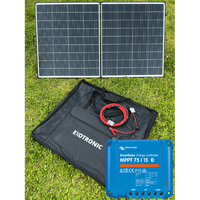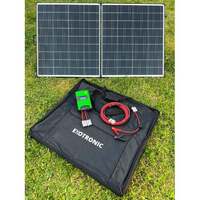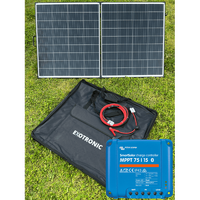Goal Zero Yeti 1000X Lithium Portable Power Station + Boulder 100 Briefcase Pack
SKU: 36210-32408 Learn More»








Product Description
Goal Zero Yeti 1000X Lithium Portable Power Station + Boulder 100 Briefcase Pack, 2 Year Warranty.
Pack Includes:
- Goal Zero Yeti 1000X Lithium Portable Power Station GZ36210
- Goal Zero Boulder 100W Briefcase GZ32408
Goal Zero Yeti 1000X Lithium Portable Power Station
Run your essential devices and appliances with the Yeti 1000X. Goal Zero's most versatile sized power station is big enough to power medium to large appliances and portable enough to pack in the car and go with you anywhere. Upgraded to include USB-C Power Delivery, integrated MPPT for increased solar charging efficiency, and faster recharge times. Power phones, laptops, camera equipment, portable fridges, medical devices, TV’s, and more.
GOODBYE GAS GENERATOR. HELLO YETI X. With a lithium-ion battery at its core, the Goal Zero Yeti X equips you with safe, clean, portable power for camping, tailgating, off-grid events, workshops, and emergency power during an outage.
FASTER CHARGING FROM THE WALL. Yeti 1000X offers up multiple recharging options. Included 120W Power Supply plugs into the 8mm charging port to recharge the Yeti in 9 hours. Industry-leading 600W High Power Port lets you recharge in as little as 2 hours using the Yeti X 600W Power Supply (sold separately).
VERSATILE PORT OPTIONS. Power a wide range of devices with seven different port options including fast-charging 60W USB-C Power Delivery, multiple USB-A ports, regulated 12V, and one 240V AC port.
EXPERIENCE UNLIMITED POWER. Charge the Yeti 1000X from the sun with our portable solar panels while away from the grid, and keep it topped off from a wall outlet when you’re home. Integrated MPPT charge controller ensures you’re getting the most efficient solar charge possible.
Ways to Charge:
- Recharge from the sun by connecting a compatible solar panel. Charge times are dependent on the size of the solar panel. The Boulder 100 Briefcase will provide 100W of solar and fully recharge the Yeti 1000X in 12-24 hours
- Plug it into the wall. Fully recharges in 9 hours using the included 120W Power Supply AC Wall Charger. Not quick enough? Drop your recharge time to 2 hours using the available 600W Power Supply or 4.5 hours with the 230W Power Supply
- The Goal Zero Yeti 1000X portable power station can be charged by plugging into your 12V adapter using the Goal Zero Yeti Lithium 12V Car Charging Cable.
Goal Zero Boulder 100W Briefcase Solar Panels & Bag
Built with tempered glass and a strong aluminum frame, this durable panel withstands heavy-duty use. A hinged design and canvas bag make for easy carrying to help keep your gear charged on the move.
Boulder 100 Briefcase Highlights:
- 100 total Watts - two 50-Watt panels (14-21.5V) chained together and connected by a hinge.
- Built with strong tempered glass and an aluminum frame with added corner protection.
- Included is a protective canvas bag for easy transport and carrying.
Tips and Tricks for using Solar Panels:
- The solar panel does not hold a charge - it only produces power when it is exposed to sunlight and connected to a power station or bank.
- Optimize solar panel efficiency by positioning them south-facing at a 45-degree angle.
- For faster recharging, use multiple solar panels.
Product Charge Time From The Boulder 100 Briefcase:
| Product: | Charge Time: |
| Goal Zero Yeti 150 | 3-6 Hours |
| Goal Zero Yeti 400 | 8-16 Hours |
| Goal Zero Yeti 1000 | 20-40 Hours |
| Goal Zero Yeti 1250 | 24-48 Hours |
| Goal Zero Yeti 1400 | 29-57 Hours |
| Goal Zero Yeti 3000 | 60-120 Hours |

Specifications
SKU 36210-32408
Brand Goal Zero
Warranty Period: 2 Years
Product Category Solar Bundles
Solar Panel Type Folding Solar Panels
Solar Panel Cell Type Monocrystalline
Watts (W) 100
Product Type Portable Power Station
Watt hours (Wh) 983
Amp hours (Ah) @ V 91Ah @ 10.8V
Battery Types Li-ion NMC (Power Station)
Dimensions Open (LxWxH) 1104 x 44 x 700mm (Solar Panel)
Dimensions (LxWxH mm) 260 x 390 x 250 mm (Power Station)
Dimensions Closed (LxWxH) 552 x 89 x 700mm (Solar Panel)
Input 8 mm Charging Port: 14-22V, up to 10A (120W max) | Charging High Power Port: 14-50V, up to 50A (600W max) (Power Station)
Operating Range (temp) 0-40°C (Power Station)
Suitable For Camping | 4WD
Net Weight (kg) 23.5
Operating Voltage 18-22V
Videos
Powering Your Trip With Caravan or Camping Solar Panels
Goal Zero: The Best Portable Power Packs for Camping?
The Best Camping Battery Packs
What Will My Camping Battery Run?
Goal Zero Boulder Solar Panels | Tech Video (Please note, US version may appear in video)
Goal Zero Yeti Powers: Charging Edition
Goal Zero Yeti Link | Car Charging
This is Goal Zero (Please note, US version may appear in video)
Goal Zero Yeti Powers: Camping Edition (Please note, US version may appear in video)
Goal Zero Yeti Powers: Home Edition (Please note, US version may appear in video)
How Solar Works (Please note, US version may appear in video)
Product Q&A
-
Can I chain a Boulder 100 Briefcase with other Boulders?
It depends on the panels. Yes, you can chain the Boulder 100 Briefcase with other Boulders that have an 8mm input or input connector, like the Boulder 50 or the older Boulder 30, by inserting the 8mm blue-ringed connector of the Boulder 100 Briefcase into the 8mm input of the other Boulder Solar Panel. When chaining Boulder Solar Panels in configurations over 150W, you’ll need to purchase a combiner cable from Goal Zero.
-
Can I mount the Boulder Briefcase Solar Panels to my roof?
The Boulder 100 and 200 Briefcases are not designed to be mounted permanently to a fixture; this briefcase fold-and-go style allows you to be more portable. For mountable panels, take a look at the Boulder 50 and 100 Solar Panels.
-
Are the Boulder Solar Panels waterproof?
Yes. The Boulders are designed to withstand the elements, so they’re great for permanent installations. What you’re recharging from the Boulders is what needs your help to stay dry, so keep those power packs and power stations covered up and protected from the dust, rain, and snow.
-
Why is the light on the 12V button blinking on my yeti 1000 Lithium?
A blinking light on the 12V button indicates the 12V car port has been shut off to protect whatever you have plugged in; you should also see RESERVE MODE blinking on the display. Recharge your Goal Zero Yeti 1000 Lithium as soon as possible to continue powering your device.
-
Why is the light on the AC button blinking on my Yeti 1000 / 1400 Lithium?
A blinking light on the AC button indicates that at the current load, the AC inverter will be shutting off soon; you should also see RESERVE MODE blinking on the display. Recharge your Goal Zero Yeti as soon as possible to continue powering your device. Once the AC inverter has shut off, the Yeti will attempt to reset itself three times. After three attempts, the AC inverter will remain off until you physically reset it by pushing the AC button or by recharging the battery a small amount.
-
What can I charge directly from the Boulder Solar Panels?
All of Goal Zero's Boulder Solar Panels are designed to charge Sherpa Power Packs and Goal Zero Yeti Portable Power Stations. If you’re looking to recharge things like headlamps, phones, and other USB devices, check out the Goal Zero foldable Nomad Solar Panels.
-
How do I know if my device will work with the Goal Zero Yeti 1000 Lithium?
First, you’ll need to determine the amount of power your device requires. This may require some research on your end, a good internet search or examining the user guide for your device should suffice.
Second, you will need to check the capacity for the individual output ports. For example, the Goal Zero Yeti’s AC port is powered by an inverter that allows for 1500W of power. This means if your device is pulling more than 1500W for an extended period of time, the Goal Zero Yeti’s inverter will shut off. Another number to watch for is the surge rating of your device as compared to that of the port. The Goal Zero Yeti inverter has an advanced surge management system that will maximize its compatibility with various devices, but there will still be items that will surge at a higher rate, and for a longer time, than the Goal Zero Yeti can manage, in which case the port will turn itself off.
Finally, once you know your device is compatible, you’ll want to determine how long you’ll be able to power your gear from the Goal Zero Yeti. Here’s a quick and dirty lesson in power. All GOAL ZERO power packs and solar generators have a number in their name, ex. Guide10 Plus Power Pack, Goal Zero Yeti 1000. These numbers refer to the Watt Hours (Wh), or the amount of energy that can be stored in each recharger, and how you’ll know if your gear is compatible with each recharger. For example, a 200Wh recharger should run a 100W light for 2 hours (200/100=2). If your gear falls within the 1000Wh capacity of the Goal Zero Yeti, you’ll want to check the restrictions on each of the output ports.
Another factor in the math is how much power is being converted going from the Goal Zero Yeti battery to the device you are powering/charging. In some situations, like when running a 12V device, such as the LAL 350, directly off the 12V port, there will be no conversion and so no additional losses. In using the USB ports to charge a phone, you add a layer of conversion (12V battery in the Goal Zero Yeti is being converted to a 5V USB output), which introduces around 10% of losses. When using the inverter, there are two layers of conversion (12V to high voltage, DC to AC). The least efficient way of using the battery in the Goal Zero Yeti is to use an AC-DC adapter off the AC ports, as is the case if you use a phone wall charger to charge your phone, as it adds yet another layer of conversion in the wall adapter.
So when you’re deciding on what to power from your new Goal Zero recharger, do some research into your device’s watt consumption
-
Is the one for sale with AU 230V outlets and or US outlets
Hi Steve,
All Goal Zero models sold in Australia without universal outlets come with Australian style outlets as standard.
-
How long will it take to charge my Goal Zero Yeti from a Boulder Solar Panel?
That depends on a few factors – how big the Yeti is, how big the Boulder is, how cloudy it is, how hot it is, just to name a few. Goal Zero have created a handy calculator that takes all of these factors into consideration. Also, great news, all the Yetis allow for something called “pass-through power”, this means you can be trickle charging your Yeti and using it to power your gear, all at the same time.
-
What's the difference between Mono & Polycrystalline solar cells?
There's actually not a whole lot of difference when it comes to Caravan, RV and Camping applications to be honest. They are different cell types and are more relevant for home grid tied roof top.
You will read that poly are better in low light conditions and mono are more efficient. But for roof top caravan's the difference is negligible.
The most important thing is to get a well-constructed roof top panel from a quality brand and get the right sizing for your application.
-
How do I know if my Goal Zero Yeti 400 / 1000 / 1400 / 3000 Lithium is charged?
To check the charge level of your Goal Zero Yeti, refer to the LCD Battery Display. When lit up, you’ll see a battery outline with 5 segments, indicating the current charge level. It is okay to use your Goal Zero Yeti even when it’s not fully charged.
-
Can I replace the battery in my Goal Zero Yeti 1000 / 1400 / 3000 Lithium?
Yes, the battery inside the Goal Zero Yeti 1000 / 1400 / 3000 Lithium is designed to be easy to replace.
1. Turn your Goal Zero Yeti upside-down and place its top surface on towel or blanket over a hard surface.
2. Remove the 10 screws on the bottom plate.
3. Unscrew the 2 bolts that connect to the battery terminals.
4. Pull on and disconnect the data connector to the battery.
5. Remove the 8 screws holding the battery pack to the Goal Zero Yeti.
6. Lift the old battery out of the body of the Goal Zero Yeti **This battery is HEAVY. Use caution and proper technique when lifting.
7. Insert replacement battery and reassemble in reverse order of steps above.
8. Replaceable batteries will be available from GoalZero.com. -
What type of battery is in my Goal Zero Lithium Yeti 400 / 1000 / 1400 / 3000?
Your Goal Zero Yeti Lithium uses custom designed Lithium Ion. Here are some basic facts about Lithium Ion batteries:
1. Lithium Ion batteries can store and release a lot of energy in a short period of time. The batteries in your Goal Zero Yeti are in a protective enclosure with a sophisticated battery management and protection system controlling its terminals to the outside world.
2. It is critical that your battery does not get wet as moisture and water can get into the battery cells behind the protection circuitry and bypass that protection.
Customer Reviews
Warranty
For details relating to this product's warranty CLICK HERE
Delivery
For details relating to our delivery process CLICK HERE


















